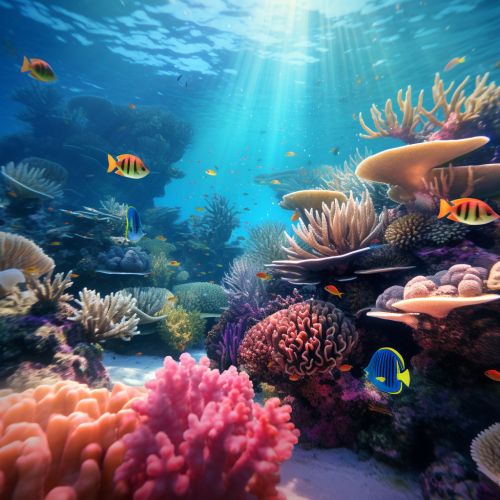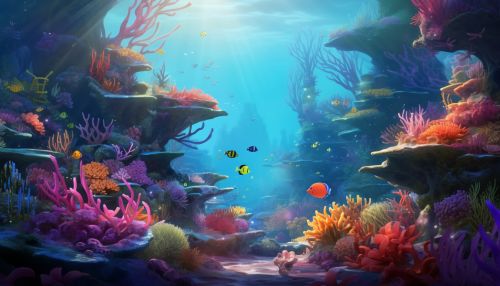Coral reefs
Introduction
Coral reefs are diverse underwater ecosystems held together by calcium carbonate structures secreted by corals. They are some of the most diverse and valuable ecosystems on Earth. Coral reefs support more species per unit area than any other marine environment, including about 4,000 species of fish, 800 species of hard corals, and hundreds of other species. Scientists estimate that there may be another 1 to 8 million undiscovered species of organisms living in and around reefs (Veron, 2000).
Formation of Coral Reefs
Coral reefs begin to form when free-swimming coral larvae attach to submerged rocks or other hard surfaces along the edges of islands or continents. As the corals grow and expand, reefs take on one of three major characteristic structures — fringing, barrier or atoll. Fringing reefs, which are the most common, project seaward directly from the shore, forming borders along the shoreline and surrounding islands. Barrier reefs also parallel the coastline but are separated by wider, deeper lagoons. Atolls, on the other hand, are circular or horseshoe-shaped reefs that enclose a lagoon but not an island.
Coral Reef Ecosystem
Coral reefs are often called the "rainforests of the sea", both due to their immense biodiversity and the fact that they are composed of large numbers of closely interacting species. They form complex ecosystems with tremendous biodiversity. Among the myriad inhabitants, the fish stand out as colourful and interesting to watch. Hundreds of species can exist in a small area of a healthy reef, many of them hidden or well camouflaged. Reef fish have developed many ingenious specialisations adapted to survival on the reefs.
Threats to Coral Reefs
Coral reefs are under threat globally from a variety of pressures, both natural and man-made. These include overfishing, destructive fishing practices, sedimentation, pollution, disease, invasive species, and climate change. The most significant threats are global climate change, which causes ocean warming, sea level rise, and ocean acidification; and unsustainable fishing practices, which can deplete key reef species and damage coral habitat.
Conservation of Coral Reefs
Efforts to conserve coral reefs have included restricting fishing, reducing pollution, and managing coastal development. Marine protected areas (MPAs) have been created to protect existing healthy reefs, and restoration projects are underway to help restore damaged ones. Despite these efforts, significant challenges remain. Coral reefs are complex ecosystems that require a healthy balance of species to thrive, and restoring this balance after it has been disrupted is a difficult task.
See Also


